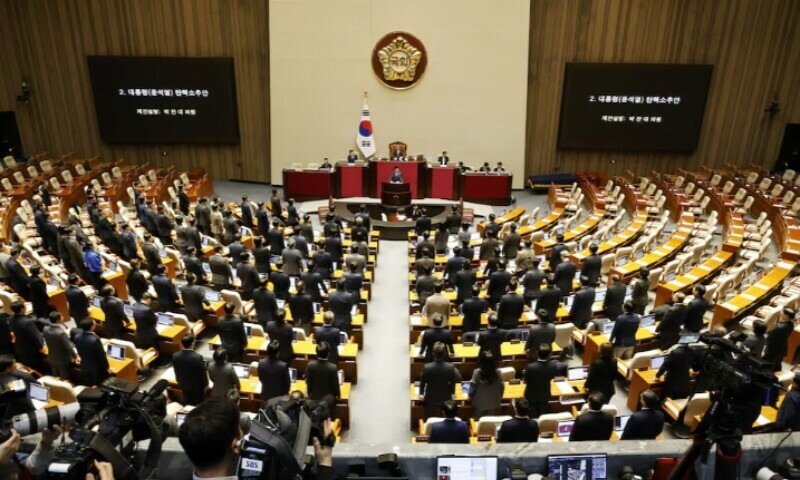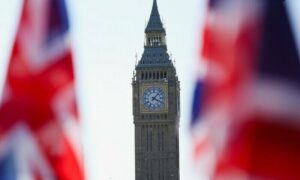South Korean President Yoon Suk Yeol survived an impeachment motion in the opposition-led parliament on Saturday that was prompted by his short-lived attempt to impose martial law this week, but the leader of his own party said the president would eventually step down.
Yoon’s People Power Party boycotted the impeachment vote, put forward by the main opposition Democratic Party, and the motion was scrapped after not enough lawmakers participated.
Only 195 votes were cast, below the threshold of 200 needed for the vote to count.
“The entire nation is watching the decision being made here at the National Assembly today. World is watching,” National Assembly speaker Woo Won-shik said with a sigh. “It’s very unfortunate that there wasn’t even a vote.”
After the vote, PPP leader Han Dong-hoon said the party had decided that Yoon would resign.
“The declaration of martial law was a clear and serious violation of the law,” Han told reporters.
Han has a history of clashes with Yoon, however, and it was unclear if he was speaking for all PPP members. There was no word yet from Yoon on Han’s comments.
“The People Power Party will pursue an orderly departure of the president in order to minimize confusion for the people,” Han said, adding that until Yoon leaves, he would be “effectively excluded from his duties, and the prime minister will consult with the party to manage state affairs.”
The main opposition Democratic Party (DP) ridiculed that idea as “absurd and illegal.”
“Neither the people, nor the law, nor anyone has given Han the power to remove (Yoon) from office,” the party said in a statement, saying impeachment is the only way.
Asked when Han will announce a roadmap for ending Yoon’s term early, a source close to Han said it was too early to say.
The DP earlier said it would revive the impeachment motion next week if it failed on Saturday.
The vote was in limbo today as members of Yoon’s party walked out and the opposition called on them to return and vote.
While lawmakers debated the motion, only a single member of Yoon’s People Power Party (PPP) remained in his seat while a couple of others returned during voting, casting doubt over whether the measure would have enough votes to pass.
The lull was an odd counterpoint to the shouts and cursing in parliament that had preceded the vote, held four days after Yoon plunged Asia’s fourth-largest economy and key US military ally into its greatest political crisis in decades, threatening to shatter South Korea’s reputation as a democratic success story.
As PPP lawmakers departed after casting votes on a separate motion to appoint a special prosecutor to investigate the first lady, some people shouted and cursed them.
When debate began on the impeachment motion, opposition lawmakers recited the names of the PPP members who had left.
After voting began, National Assembly Speaker Woo Won-shik called on PPP members to return as opposition lawmakers settled in.
One of the PPP members who returned told reporters he had voted against the impeachment motion as he did not agree with the bill, but still thought Yoon was not qualified to be president.
In the morning, Yoon apologised to the nation for his attempt to impose martial law but did not resign, defying intense pressure to step down even from some in his ruling party.
Yoon said he would not seek to avoid legal and political responsibility for his decision to declare martial law for the first time in South Korea in 44 years. He said the decision was born of desperation.
Yoon ‘very sorry’
Saturday’s televised speech was the embattled leader’s first public appearance since he rescinded the martial law order six hours after declaring it when parliament defied military and police cordons to vote unanimously against his decree.
“I leave it up to my party to take steps to stabilise the political situation in the future, including the issue of my term in office,” Yoon said in the address to the nation, promising there would be no second attempt to impose martial law.
Standing in front of the South Korean flag, Yoon bowed after he finished his brief remarks and stared solemnly into the camera for a moment.
Han Dong-hoon, leader of Yoon’s ruling party, said after the address that the president was no longer in a position to carry out his public duties and his resignation was now unavoidable.
On Friday, Han said Yoon was a danger to the country and needed to be removed from power, increasing the pressure on Yoon to quit even though PPP members later reaffirmed a formal opposition to his impeachment.
If Yoon leaves office before his single five-year term ends in May 2027, the constitution requires a presidential election to be held within 60 days of his departure.
Martial law has been declared more than a dozen times since South Korea was established as a republic in 1948, the last time in 1980.
Martial law shockwaves
Yoon shocked the nation late on Tuesday when he gave the military sweeping emergency powers in order to combat unspecified threats from “North Korean communist forces”, and “to eradicate the shameless pro-North anti-state forces”.
He went on to accuse the National Assembly of launching an unprecedented number of impeachment efforts against members of his administration, effectively paralysing key operations, and handling the budget in a way that undermined the fundamental functions of the government, including public safety.
Yoon has been dogged by personal scandals and strife, an unyielding opposition and rifts within his own party. Once regarded as a tough political survivor he has become increasingly isolated.
The martial law declaration sent shockwaves around the world and drew rare criticism from senior American officials who had previously praised Yoon as a champion of democracy in Asia. Defence Secretary Lloyd Austin scrapped plans to travel to South Korea, two US officials told Reuters on Thursday.
Some PPP members urged Yoon to resign before Saturday’s vote, saying they did not want a repeat of the 2016 impeachment of then-president Park Geun-hye, who left office after months of candle-lit protests over an influence-peddling scandal. Her downfall triggered the implosion of the party and a victory by liberals in presidential and general elections.
In scenes reminiscent of those protests, thousands of demonstrators holding candles assembled outside parliament on Friday and Saturday nights, demanding Yoon’s impeachment.
Protester Choi Yong-Ho, 60, said he was furious at the prospect that the impeachment bill may not succeed, but vowed to keep coming to future protests.
“We have to make our voices heard,” he said.
If Yoon is impeached, a trial by the Constitutional Court would follow. The court can confirm an impeachment motion with a vote by six of the nine justices. The court currently only has six sitting judges, and it is unclear whether it would take on the case without at least seven.
In 2017, the court took three months to remove then-president Park from office.
Prosecutors, the police and the Corruption Investigation Office for High-ranking Officials have all launched probes into Yoon and senior officials involved in the martial law decree, seeking to pursue charges of insurrection and abuse of power, among others.
The officials face potential charges of insurrection, abuse of authority and obstructing other people from exercising their rights. If convicted, the crime of leading an insurrection is punishable by death or life imprisonment, with or without prison labour.







